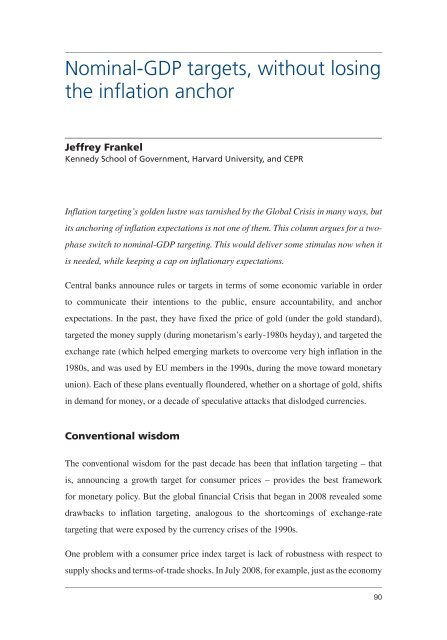Inflation <strong>targeting</strong>: Fix it, don’t scrap itWoodford, Michael (2012a), “Forecast Targeting as a Monetary Policy Strategy: PolicyRules in Practice,” in EF Koenig, R Leeson, and GA Kahn (eds.) The Taylor Rule andthe Transformation of Monetary Policy, Stanford, CA, Hoover Institution Press.Woodford, Michael (2012b), “Methods of Policy Accommodation at the Interest-RateLower Bound”, presented at the Federal Reserve Bank of Kansas City Symposium onthe Changing Policy Landscape, September 2012b.Wren-Lewis, Simon (2013), written evidence submitted to the House of CommonsTreasury Committee, for the hearing on the Appointment of Dr Mark Carney asGovernor of the Bank of England, January 2013.About the authorMichael Woodford has been the John Bates Clark Professor of Political Economyat Columbia University since 2004, after previous appointments at Columbia, theUniversity of Chicago, and Princeton University. He received his A.B. from theUniversity of Chicago, his J.D. from Yale Law School, and his PhD in Economics fromM.I.T. He has been a MacArthur Fellow and a Guggenheim Fellow, and is a Fellow ofthe American Academy of Arts and Sciences, as well as a Fellow of the EconometricSociety, a Research Associate of the National Bureau of Economic Research (Cambridge,Mass.), and a Research Fellow of the Centre for Economic Policy Research (London).In 2007 he was awarded the Deutsche Bank Prize in Financial Economics. He is theauthor of Interest and Prices: Foundations of a Theory of Monetary Policy, recipientof the 2003 Association of American Publishers Award for Best Professional/ScholarlyBook in Economics, and co-author or co-editor of several other volumes, includingNorth-Holland’s three-volume Handbook of Macroeconomics (with John B. Taylor)and The Inflation Targeting Debate (with Ben S. Bernanke).89
Nominal-GDP targets, without losingthe <strong>inflation</strong> anchorJeffrey FrankelKennedy School of Government, Harvard University, and CEPRInflation <strong>targeting</strong>’s golden lustre was tarnished by the Global Crisis in many ways, butits anchoring of <strong>inflation</strong> expectations is not one of them. This column argues for a twophaseswitch to nominal-GDP <strong>targeting</strong>. This would deliver some stimulus now when itis needed, while keeping a cap on <strong>inflation</strong>ary expectations.Central banks announce rules or targets in terms of some economic variable in orderto communicate their intentions to the public, ensure accountability, and anchorexpectations. In the past, they have fixed the price of gold (under the gold standard),targeted the money supply (during monetarism’s early-1980s heyday), and targeted theexchange rate (which helped emerging markets to overcome very high <strong>inflation</strong> in the1980s, and was used by EU members in the 1990s, during the move toward monetaryunion). Each of these plans eventually floundered, whether on a shortage of gold, shiftsin demand for money, or a decade of speculative attacks that dislodged currencies.Conventional wisdomThe conventional wisdom for the past decade has been that <strong>inflation</strong> <strong>targeting</strong> – thatis, announcing a growth target for consumer prices – provides the best frameworkfor monetary policy. But the global financial Crisis that began in 2008 revealed somedrawbacks to <strong>inflation</strong> <strong>targeting</strong>, analogous to the shortcomings of exchange-rate<strong>targeting</strong> that were exposed by the currency crises of the 1990s.One problem with a consumer price index target is lack of robustness with respect tosupply shocks and terms-of-trade shocks. In July 2008, for example, just as the economy90
- Page 5 and 6:
Centre for Economic Policy Research
- Page 8 and 9:
ForewordSince the onset of the Glob
- Page 11 and 12:
IntroductionLucrezia Reichlin and R
- Page 13 and 14:
Is inflation targeting dead? Centra
- Page 15 and 16:
Is inflation targeting dead? Centra
- Page 17 and 18:
Is inflation targeting dead? Centra
- Page 19 and 20:
Is inflation targeting dead? Centra
- Page 21 and 22:
Is inflation targeting dead? Centra
- Page 23 and 24:
Is inflation targeting dead? Centra
- Page 25 and 26:
Is inflation targeting dead? Centra
- Page 27 and 28:
Is inflation targeting dead? Centra
- Page 29 and 30:
Is inflation targeting dead? Centra
- Page 31 and 32:
Is inflation targeting dead? Centra
- Page 33 and 34:
Is inflation targeting dead? Centra
- Page 35 and 36:
Is inflation targeting dead? Centra
- Page 37 and 38:
Is inflation targeting dead? Centra
- Page 39 and 40: Is inflation targeting dead? Centra
- Page 41: Is inflation targeting dead? Centra
- Page 44 and 45: Is inflation targeting passé?Frank
- Page 46 and 47: Monetary targetry: Might Carney mak
- Page 48 and 49: Monetary targetry: Might Carney mak
- Page 50 and 51: Monetary targetry: Might Carney mak
- Page 52 and 53: Is inflation targeting dead?Ben Bro
- Page 54 and 55: Is inflation targeting dead?to rais
- Page 56 and 57: Is inflation targeting dead?to ‘l
- Page 58 and 59: Is inflation targeting dead?The cos
- Page 60 and 61: Cheap talk is no alternative toinfl
- Page 62 and 63: Cheap talk is no alternative to inf
- Page 64 and 65: Cheap talk is no alternative to inf
- Page 66 and 67: Cheap talk is no alternative to inf
- Page 68 and 69: The evolution of modern central ban
- Page 70 and 71: The evolution of modern central ban
- Page 72 and 73: The evolution of modern central ban
- Page 74 and 75: The evolution of modern central ban
- Page 76 and 77: Inflation targeting: Fix it, don’
- Page 78 and 79: Inflation targeting: Fix it, don’
- Page 80 and 81: Inflation targeting: Fix it, don’
- Page 82 and 83: Inflation targeting: Fix it, don’
- Page 84 and 85: Inflation targeting: Fix it, don’
- Page 86 and 87: Inflation targeting: Fix it, don’
- Page 88 and 89: Inflation targeting: Fix it, don’
- Page 92 and 93: Nominal-GDP targets, without losing
- Page 94 and 95: Nominal-GDP targets, without losing
- Page 96 and 97: Reviving ‘money and banking’Mar
- Page 98 and 99: Reviving ‘money and banking’col
- Page 100 and 101: Reviving ‘money and banking’Thi
- Page 102 and 103: Reviving ‘money and banking’pro
- Page 104 and 105: Reviving ‘money and banking’200
- Page 106 and 107: A broader mandate: Why inflation ta
- Page 108 and 109: A broader mandate: Why inflation ta
- Page 110 and 111: A broader mandate: Why inflation ta
- Page 112 and 113: A broader mandate: Why inflation ta
- Page 114 and 115: Flexible inflation targeting:Perfor
- Page 116 and 117: Flexible inflation targeting: Perfo
- Page 118 and 119: Flexible inflation targeting: Perfo
- Page 120 and 121: Flexible inflation targeting: Perfo
- Page 122 and 123: Will central banking change?allowed
- Page 124 and 125: Will central banking change?unemplo
- Page 126 and 127: Will central banking change?About t
- Page 128 and 129: Central banking after the crisis: C
- Page 130 and 131: Central banking after the crisis: C
- Page 132 and 133: Central banking after the crisis: C
- Page 135 and 136: Challenges to inflation targetingaf
- Page 137 and 138: Is inflation targeting dead? Centra
- Page 139 and 140: Is inflation targeting dead? Centra
- Page 141:
Fourteen world-renowned scholars, p



